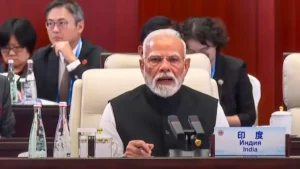IMRAN-XI HANDSHAKE TIGHTENS CHINESE GRIP ON PAKISTAN
As visiting Prime Minister Imran Khan clasped hands with Chinese President Xi Jinping in Beijing on February 6, it became evident that the Chinese grip is much more than ceremonial or symbolic.
Estimates may vary, whether it is 80, 90 or cent percent, but Pakistan’s dependence on China for its economic well-being, short, medium and long-term, is heavy and promises to increase.
While China committed projects worth USD 3.5 billion and its enterprises showed interest in many Pakistani projects, going by the media reports, there was no word whether a USD three billion loan which some Pakistani media outlets said Pakistan was ‘eyeing’, materialised.
While China does not easily give out cash, even to the “all-weather ally” that Pakistan is, the latter’s need is desperate, not just to meet its foreign debt servicing needs and domestic use, but also as elbow room as it seeks a bigger loan from the International Monetary Fund (IMF). Khan has earned the sobriquet of being an “international beggar” from critics at home. His money dealings with other allies, Saudi Arabia and the UAE have been both iffy and inadequate.
According to Pakistani economist Kaiser Bengali Pakistan is now 100% dependent on China for financial and economic assistance. He told German media outlet DW on the eve of Khan’s Beijing visit that the “immediate purpose of the visit” was to seek the loan from Beijing, reflecting Pakistan’s growing reliance on China.
“While the conditions of the IMF are made public, China keeps the terms and conditions of loans and projects secret, which leads to suspicions,” he said.
There were some definite results of commitments and promises, immediate and for the future during the four-day high-profile visit, the first by Khan in nearly two years. While China may be willing, cautious, Pakistan’s own ability to match the Chinese efforts on the ground remain in doubt, especially at the governance level and more especially, security.
On the last day of Khan’s visit came the news of five Pakistani soldiers being killed in firing, likely by the Tehreek-e-Taliban Pakistan (TTP) in Kurram in Khyber Pakhtunkhwa in the north. This marked a sudden shift in the terrain from Balochistan in the South where nearly 50 soldiers and civilians have died since the beginning of this year.
Chinese personnel have lost lives while working in both volatile provinces. Given this vulnerable security scenario, neither side could be excited while discussing as the second phase of China Pakistan Economic Corridor (CPEC) takes off.
Khan and his team were keen to impress the Chinese entrepreneurs to invest in Pakistan. Their disappointment came when thanks to restrictions placed by the Covid-19 pandemic, they were forced to address them virtually. Reports said that their pleas for a physical conference were turned down by the hosts.
At the diplomatic level, the visit remained essentially bilateral. Efforts to meet Russian President Vladimir Putin who was also in Beijing for the Games did not materialise.
In the process of moving away from an ‘unreliable’ America that has quit from the neighbouring Afghanistan, Pakistan is widely perceived as moving close to China. But Khan chose to ‘advise’ Beijing against a repeat of “cold war” in the region, trying to convey that it wished to stay out of the US-China conflict. Analysts said neither the US or China appreciates such posturing.
For the rest, Khan attacked perennial adversary India, even commenting upon the latter’s internal political situation, something Beijing would be better aware of without Pakistan’s unsolicited briefing.
Khan’s take on Afghanistan also could not have impressed Chinese leadership. It is pleading for humanitarian aid for the Taliban, the new rulers it claims to have helped install in Kabul, even as it attacks them for not curbing the TTP, the very people who have kept on the boil two major provinces through which the CPEC runs.
Imran’s visit was the spectacle of a poor cousin coming to seek help while rendering unsolicited counsel to the wealthy and powerful host.










